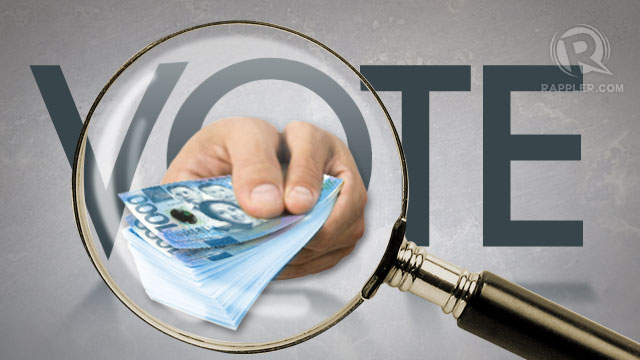SUMMARY
This is AI generated summarization, which may have errors. For context, always refer to the full article.

MANILA, Philippines (UPDATED) – Look who’s most outraged at the Commission on Elections (Comelec) airtime limits for candidates, even protesting this rule before the Supreme Court (SC).
Not the candidates themselves.
On Friday, February 8, broadcast networks GMA Network Inc and TV5 got the ball rolling, and filed petitions against the Comelec’s airtime rules.
In its 56-page petition for certiorari, GMA Network criticized Comelec Resolution No. 9615 and its amendment, Resolution No. 9631, as “too restrictive.”
The network said the SC should stop the Comelec from implementing its airtime limits, the most stringent in almost a decade. Unlike in recent years, the Comelec will impose aggregate and not per-station ad limits.
This means that in computing if a candidate has breached the ad limits, the Comelec will factor in all his ads across all broadcast networks. Since former Comelec chair Benjamin Abalos loosely interpreted the Fair Elections Act in 2004, until this year, the Comelec has computed a candidate’s ad limits on a per-station basis. (Read: Why revert to old airtime cap for pols?)
“We raised that the aggregate airtime for political advertisements is restrictive considering that it impinges on the right to suffrage and the right of the people to be informed on important matters and the right of the people to free speech and expression,” said one of GMA Network’s lawyers, Maria Estelita Arles, in an interview posted on the network’s news website.
In a separate 86-page petition, TV5 said the airtime rule is “vague as it does not provide for a definitive manner in which aggregation shall be made thus making it difficult or impossible for media outlets to comply while subjecting them to possible criminal liability and loss of franchise permits.”
The Comelec, however, refuted claims that the airtime limits infringe on the right to information and press freedom.
‘More petitions, better’
Speaking to Rappler, Kapisanan ng mga Brodkaster ng Pilipinas (KBP) chair Jun Nicdao said the organization will file its own petition next week.
Traditionally among the biggest gainers in campaigns, other networks will file separate petitions as well, Nicdao said. “The more petitions, the better,” he explained, quoting a lawyer.
The campaign period begins on Tuesday, February 12. By then, the Comelec will keep a close watch on compliance with the following propaganda limits:
-
For all national candidates, 120 minutes in all TV networks and 180 minutes in all radio stations
-
For all local candidates, 60 minutes in all TV networks and 90 minutes in all radio stations
GMA Network and the KBP earlier appealed to the Comelec to reconsider this rule, with KBP also citing the public’s right to information. KBP president Herman Basbaño said their opposition is not merely business-driven. (Watch more in the video below.)
“It’s not all about money. As I said a while ago, out of concern also for the public, and for the right of other sectors, like the candidates, who may lose the chance to reach the public. In the same manner that the public will be deprived, as I said, of their right to know whatever they want about their candidates,” Basbaño said in a mix of English and Filipino
The Comelec, however, unanimously struck down their appeal.
Unlike the broadcast giants, no political party has trooped to the Comelec to protest the new airtime rules. Much less has any politician filed a petition over this before the SC.
“Hindi ko maintindihan bakit KBP ang lumalaban sa airtime eh. I think it should be the candidates who should question it,” said Comelec chair Sixto Brillantes Jr in an earlier interview with reporters. (I can’t understand why it’s KBP that’s protesting the airtime limits.)
Spirit of the law
By revising its airtime rules, the Comelec wanted to stick to the spirit of the Fair Elections Act. In an interview with Rappler, now retired Comelec Commissioner Rene Sarmiento said “the dominant spirit was to level the playing field” among the candidates.
The Fair Elections Act, on which the Comelec based its airtime rules, does not mention the right to information – one of the broadcast networks’ main arguments to strike down the new resolutions.
What the law does say is this: “All registered parties and bona fide candidates shall have equal access to media time and space.” By imposing equal limits for national and for local candidates, the Comelec resolutions achieve this.
Candidates like Sen Chiz Escudero, in fact, welcomed the airtime limits.
“Those who have deep resources will no longer lord over the airwaves and leave those who have meager resources way, way behind… At least no single candidate can put one over the other in terms of airtime. It’s a fair game for everyone,” Escudero earlier said.
One of Brillantes’ harshest critics, Sen Alan Peter Cayetano, also said the Comelec is right in limiting campaign expenses. He said the more crucial move, however, is to monitor those who bankroll a candidate’s campaign.
Other watchdogs earlier urged the Comelec to also monitor campaign funders.
It is crucial to monitor campaign expenses, election watchdogs say, to ensure that candidates wouldn’t engage in corruption to recover what they spent. – Rappler.com
Add a comment
How does this make you feel?
There are no comments yet. Add your comment to start the conversation.